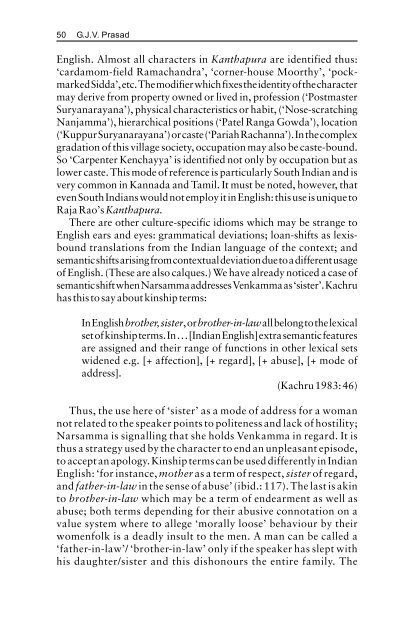post-colonial_translation
post-colonial_translation
post-colonial_translation
You also want an ePaper? Increase the reach of your titles
YUMPU automatically turns print PDFs into web optimized ePapers that Google loves.
50 G.J.V. Prasad<br />
English. Almost all characters in Kanthapura are identified thus:<br />
‘cardamom-field Ramachandra’, ‘corner-house Moorthy’, ‘pockmarked<br />
Sidda’, etc. The modifier which fixes the identity of the character<br />
may derive from property owned or lived in, profession (‘Postmaster<br />
Suryanarayana’), physical characteristics or habit, (‘Nose-scratching<br />
Nanjamma’), hierarchical positions (‘Patel Ranga Gowda’), location<br />
(‘Kuppur Suryanarayana’) or caste (‘Pariah Rachanna’). In the complex<br />
gradation of this village society, occupation may also be caste-bound.<br />
So ‘Carpenter Kenchayya’ is identified not only by occupation but as<br />
lower caste. This mode of reference is particularly South Indian and is<br />
very common in Kannada and Tamil. It must be noted, however, that<br />
even South Indians would not employ it in English: this use is unique to<br />
Raja Rao’s Kanthapura.<br />
There are other culture-specific idioms which may be strange to<br />
English ears and eyes: grammatical deviations; loan-shifts as lexisbound<br />
<strong>translation</strong>s from the Indian language of the context; and<br />
semantic shifts arising from contextual deviation due to a different usage<br />
of English. (These are also calques.) We have already noticed a case of<br />
semantic shift when Narsamma addresses Venkamma as ‘sister’. Kachru<br />
has this to say about kinship terms:<br />
In English brother, sister, or brother-in-law all belong to the lexical<br />
set of kinship terms. In . . . [Indian English] extra semantic features<br />
are assigned and their range of functions in other lexical sets<br />
widened e.g. [+ affection], [+ regard], [+ abuse], [+ mode of<br />
address].<br />
(Kachru 1983: 46)<br />
Thus, the use here of ‘sister’ as a mode of address for a woman<br />
not related to the speaker points to politeness and lack of hostility;<br />
Narsamma is signalling that she holds Venkamma in regard. It is<br />
thus a strategy used by the character to end an unpleasant episode,<br />
to accept an apology. Kinship terms can be used differently in Indian<br />
English: ‘for instance, mother as a term of respect, sister of regard,<br />
and father-in-law in the sense of abuse’ (ibid.: 117). The last is akin<br />
to brother-in-law which may be a term of endearment as well as<br />
abuse; both terms depending for their abusive connotation on a<br />
value system where to allege ‘morally loose’ behaviour by their<br />
womenfolk is a deadly insult to the men. A man can be called a<br />
‘father-in-law’/ ‘brother-in-law’ only if the speaker has slept with<br />
his daughter/sister and this dishonours the entire family. The


